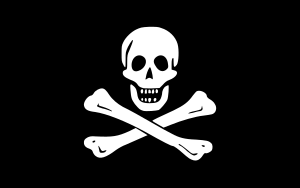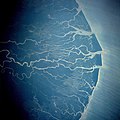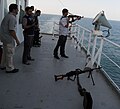Introduction

Piracy is an act of robbery or criminal violence by ship or boat-borne attackers upon another ship or a coastal area, typically with the goal of stealing cargo and other valuable goods. Those who conduct acts of piracy are called pirates, and vessels used for piracy are called pirate ships. The earliest documented instances of piracy were in the 14th century BC, when the Sea Peoples, a group of ocean raiders, attacked the ships of the Aegean and Mediterranean civilisations. Narrow channels which funnel shipping into predictable routes have long created opportunities for piracy, as well as for privateering and commerce raiding.
Historic examples of such areas include the waters of Gibraltar, the Strait of Malacca, Madagascar, the Gulf of Aden, and the English Channel, whose geographic structures facilitated pirate attacks. The term piracy generally refers to maritime piracy, although the term has been generalized to refer to acts committed on land, in the air, on computer networks, and (in science fiction) outer space. Piracy usually excludes crimes committed by the perpetrator on their own vessel (e.g. theft), as well as privateering, which implies authorization by a state government.
Piracy or pirating is the name of a specific crime under customary international law and also the name of a number of crimes under the municipal law of a number of states. In the 21st century, seaborne piracy against transport vessels remains a significant issue, with estimated worldwide losses of US$25 billion in 2023, increased from US$16 billion per year in 2004. (Full article...)
Selected biography -
Simon Fernandes (Portuguese: Simão Fernandes; c. 1538 – c. 1590) was a 16th-century Portuguese-born navigator and sometimes pirate who piloted the 1585 and 1587 English expeditions to found colonies on Roanoke island, part of modern-day North Carolina but then known as Virginia. Fernandes trained as a navigator in Spain at the famed Casa de Contratación in Seville, but later took up arms against the Spanish empire, preying upon Spanish shipping along with fellow pirate John Callis. Charged with piracy in 1577, he was saved from the hangman's noose by Sir Francis Walsingham, becoming a Protestant and a subject of the Queen of England. In 1578 Fernandes entered the service of Sir Humphrey Gilbert and later Sir Walter Raleigh, piloting the failed 1587 expedition to Roanoke, known to history as the "Lost Colony".
Fernandes disappears from the records after 1590, when he sailed with an English fleet to the Azores, a journey from which he most likely did not return alive. However, a copy of one of his charts of the East coast of North America still survives in the Cotton Collection, and was probably one of the chief sources used by John Dee for his 1580 map justifying English claims to North America. (Full article...)Selected article -

Piracy in the Gulf of Guinea affects a number of countries in West Africa as well as the wider international community. By 2011, it had become an issue of global concern. Pirates in the Gulf of Guinea are often part of heavily armed criminal enterprises, who employ violent methods to steal oil cargo. In 2012, the International Maritime Bureau, Oceans Beyond Piracy and the Maritime Piracy Humanitarian Response Program reported that the number of vessels attacks by West African pirates had reached a world high, with 966 seafarers attacked during the year. According to the Control Risks Group, pirate attacks in the Gulf of Guinea had by mid-November 2013 maintained a steady level of around 100 attempted hijackings in the year, a close second behind the Strait of Malacca in Southeast Asia.
Piracy in the Gulf of Guinea continues to be a concern to significantly affect the shipping industry, surging again in the 2020s. Governments in the region generally highlight that the fight against piracy requires a broad understanding of maritime security throughout the Gulf of Guinea. (Full article...)Did you know?
- ... that indigenous Australian artist Daniel Boyd has depicted colonial figures including Captain James Cook and Governor Arthur Phillip as pirates?
- ... that since 1904 the Gasparilla Pirate Festival in Tampa, Florida, has featured a pirate-themed parade?
- ... that HMS Redpole, one of the aptly-named coffin brigs, sank in an action with a pirate vessel in August 1828?
- ... that Saudi Arabian broadcaster beoutQ pirated and resold beIN Sports programmes during the Qatar diplomatic crisis?
- ... that the developers of Hotline Miami 2: Wrong Number suggested that Australian customers pirate their game?
- ... that the opera The Devil and Daniel Webster features a jury of ghosts made up of famous historical American figures who are now residents of Hell; including the pirate Blackbeard?
- ... that red Jolly Roger flags were the most feared of all; all prayed they never encountered the "Bloody Red," which boldly declared that no mercy would be shown and all victims would be killed?
- ... that in the Golden Age of Piracy, the word "pirate" was often spelled "pyrate" or "pyrat"?
- ... that there is only one account of walking the plank?
Selected quotations
General images
Selected Jolly Roger

Subcategories
Topics
WikiProjects
Related portals
Things you can do

Contribute
- Work on piracy and pirate articles and help improve them to featured articles.
Expand
Join
WikiProject Piracy Requests
- eliminate red links from List of pirates
- expand Timeline of piracy, specifically to fill in vast gap between the 1890s to 2000s
- revise Bartholomew Roberts
- help with Requested articles and Expand articles
- help with Portal:Piracy
- Create Modern Piracy
Associated Wikimedia
The following Wikimedia Foundation sister projects provide more on this subject:
- Commons
Free media repository - Wikibooks
Free textbooks and manuals - Wikidata
Free knowledge base - Wikinews
Free-content news - Wikiquote
Collection of quotations - Wikisource
Free-content library - Wikiversity
Free learning tools - Wiktionary
Dictionary and thesaurus








































































































